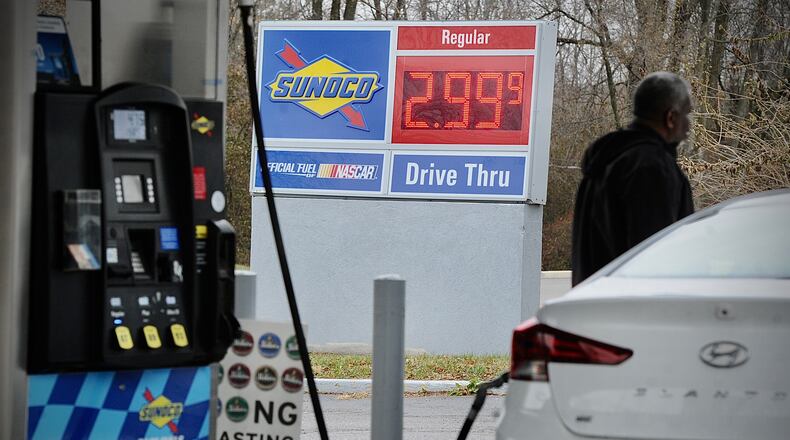The average Ohio gas price sat at $3.43, down 15 cents from a week ago and 23 cents from a month ago, according to the data. But variations from station to station were dramatic.
In Dayton, more than a dozen stations were selling gas for less than $3 a gallon on Monday afternoon, with one station in New Lebanon dropping its price to $2.69 a gallon, according to GasBuddy, which tracks fuel prices. In Springfield, seven stations sold gas for less than $3, while there were no stations in Butler County that had fallen below the $3 mark.
Meanwhile GasBuddy also showed some stations in Troy, north Dayton and West Carrollton selling gas for $3.49 or more. The most common gas price found at the nation’s 150,000 stations on Monday hit $2.99 per gallon, overtaking $3.39 a gallon, said Patrick De Haan, senior petroleum analyst for GasBuddy.
“Stations have slowly passed along the decreases and there’s more in the pipeline,” De Haan said. “We’re seeing plenty of potential for stations to go down. Some are going down much faster than others.”
Gas prices dropping
| U.S. | Ohio | Dayton | Springfield | Cincinnati | |
|---|---|---|---|---|---|
| Monday's average | $3.55 | $3.43 | $3.29 | $3.18 | $3.60 |
| Average a week ago | $3.66 | $3.58 | $3.50 | $3.39 | $3.72 |
| Average a month ago | $3.76 | $3.66 | $3.54 | $3.53 | $3.78 |
| Average a year ago | $3.39 | $3.20 | $3.11 | $3.06 | $3.19 |
Dayton, Springfield and Cincinnati stations, on average, were down 21 cents, 21 cents and 12 cents, respectively, compared to a week ago and down 23 cents, 32 cents and 17 cents compared to a month ago.
Prices continue to drop because of a continuing combination of factors, including decreased demand, the end of refinery maintenance season and “a lot of downward pressure on oil prices,” De Haan said.
Gas prices have been on a roller coaster ride since Russia’s invasion of the Ukraine back in February, rising from around $3 in January, to a peak of a little more than $5 in June. Since then, prices have mostly trended downward, only rising because of “temporary refining snags,” he said.
The national average price of gasoline is about 14 cents away from falling below year-ago levels, something that appears possible to happen in the next two weeks or so, De Haan said.
Gas demand fell from 8.74 million to 8.33 million barrels a day last week, AAA said Monday, citing data from the Energy Information Administration. Meanwhile, total domestic gasoline stocks rose by more than 3 million barrels to 211 million barrels.
“Increasing supply and fewer drivers fueling up have pushed pump prices lower,” AAA said. “As demand remains low and stocks grow, drivers will likely see pump prices keep falling.”
De Haan said on his blog that “all the metrics look very positive for motorists as this week is likely to continue seeing falling gasoline prices, with many areas falling to the lowest level since Russia’s invasion of Ukraine in February.
“It’s entirely possible the national average price of gasoline could fall under $3 per gallon by Christmas, which would be a huge gift to unwrap for motorists after a dizzying year at the pump,” he said.
The Great Lakes region, including Ohio, could also see the average price for a gallon of gas continue to drop for the next couple of weeks, De Haan said.
“I wouldn’t say it’s a foregone conclusion, but at this point, it’s pretty close,” he said. “There’s not much that I’m seeing that would change that. Only something that’s significant and unforeseeable could derail that now.”
De Haan cautioned against blaming political leaders for price increases or crediting them for price declines.
“President Trump didn’t lower prices in 2020, Covid did,” De Haan tweeted. “President Biden didn’t raise prices in 2022, Covid recovery and Russia’s war on Ukraine did. Market fundamentals overpower politics.
“Alternatively, President Trump didn’t raise prices in 2018 and 2019 ... fundamentals did. President Biden didn’t lower prices in late 2022, fundamentals did.”
About the Author


